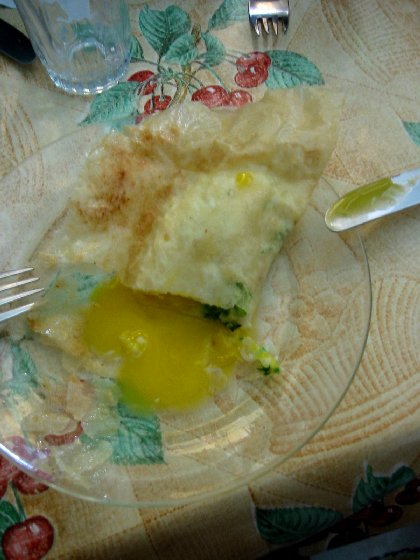David's Diary: Wednesday, November 20, 2002
Food in Tunisia

Public Market
It has taken us a while to get used to shopping in Monastir. Supermarkets only stock dry goods, so we make regular trips to the market to stock Dragonsinger. Fresh fruit and vegetables are plentiful and inexpensive, but you can only buy what is in season. This can make meal planning a bit of a challenge, but we have been adapting. It is surprising how much food two adults and three growing children eat. We know, because the market is about a kilometer away and we have to haul everything on foot back to the boat.

Water
Like every other country we have been to it is interesting to see food labels. This water bottle label is written in Arabic. Because Tunisia was a French colony for many years, this bottle also has a French label on the other side. We know enough French to make sure that this bottle of water does not have gas bubbles. After a while you just get used to the Arabic labels, just as we have got used to French, Spanish, Italian, and Croatian ones in the last year.

Beer
Only two types of beer are brewed locally. The Tunisians charge a premium for their beer -- it is the most expensive beer that we have purchased on our trip. It is interesting to see the well-known Löwenbräu brand, with its characteristic blue colour, with Arabic writing.

Wine
Tunisia makes its own wine. We find some of the red wine to be acceptable, but we have not found a white that we like. We are glad that we stocked up on wine in Italy and Malta, so that we have more variety. We have got into the European style of eating where we almost always enjoy a glass of wine with our evening meal.
Tunisia has a policy of replacing imported products with their ones made in Tunisia. This means that there is no imported wine to be found in any of the Supermarket shelves. If you do find imported products in other food categories, you find that they are many times the price of Tunisian products.

Brik: A Tunisian Speciality, Egg and Tuna in a Wafer-thin Crust
There are a few Tunisian food specialities that you can order in restaurants. One of these is Brik. A wafer-thin pastry is filled with tuna and other fillings. Then a fresh egg is added, the edges folded up and the whole thing is deep-fried for one or two minutes. The result is a perfectly cooked egg that you get to enjoy as you cut into the crispy crust.

A Truckload of Fennel
Fennel is common. This truck is weighed down to the point where it has no suspension left. We have never cooked with fennel before, but because it is one of the main vegetables available right now we have started to learn how to cook it. One surprise has been how mild the taste of fennel is. We are used to using fennel seeds in cooking. The seeds have a strong liquorice taste, but the bulb is much milder. We use it in vegetarian chilli, lamb curry, and cooked on its own with a bit of cream.

Fall Harvest of Vegetables
In fall, there is a large selection of fruit and vegetables at the market. We are told that by winter there will be a lot fewer things to choose from. We have no way of storing vegetables on Dragonsinger, so we just enjoy the selection and take advantage of it in our cooking. As I do most of the cooking onboard, I have been trying to use some of the different ingredients that we see at the market. One thing we have discovered is that prices for food in Tunisia are very low. We can experiment all we want knowing that it will not cost us a lot.